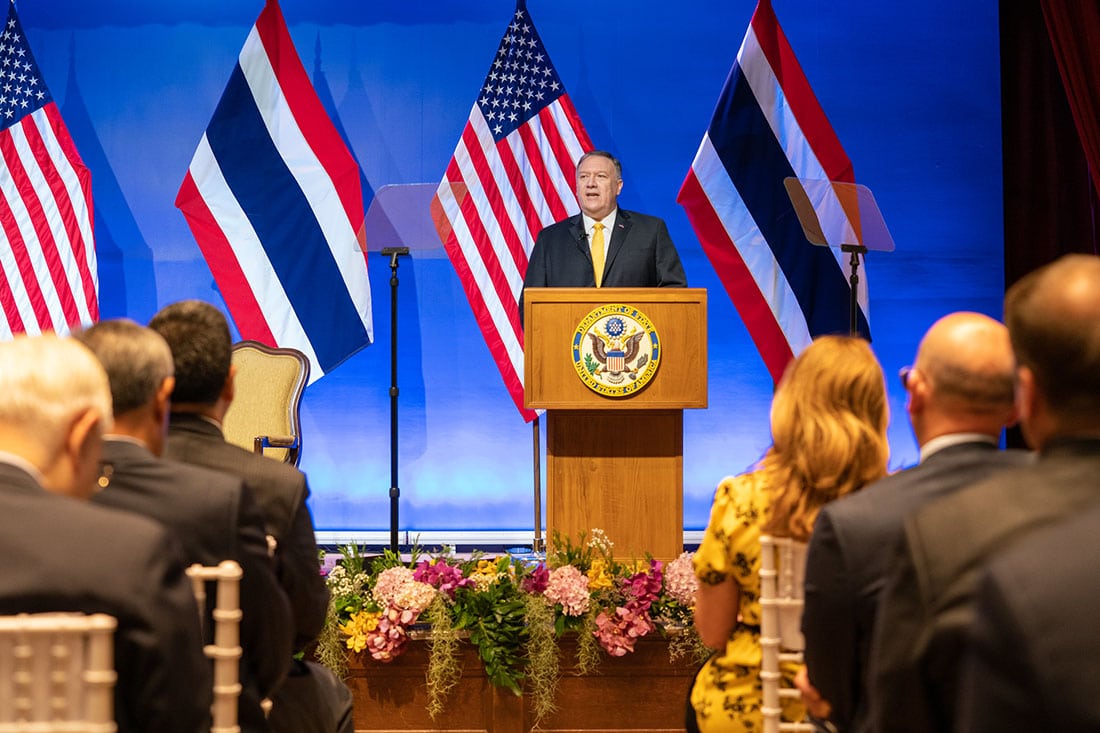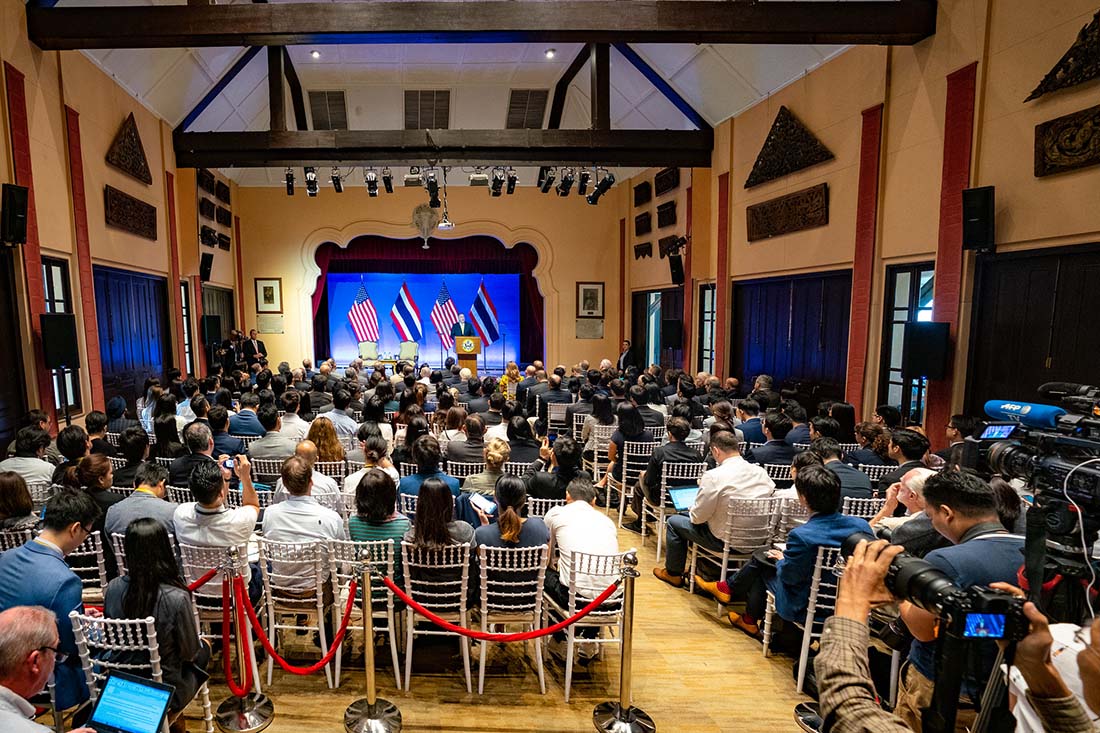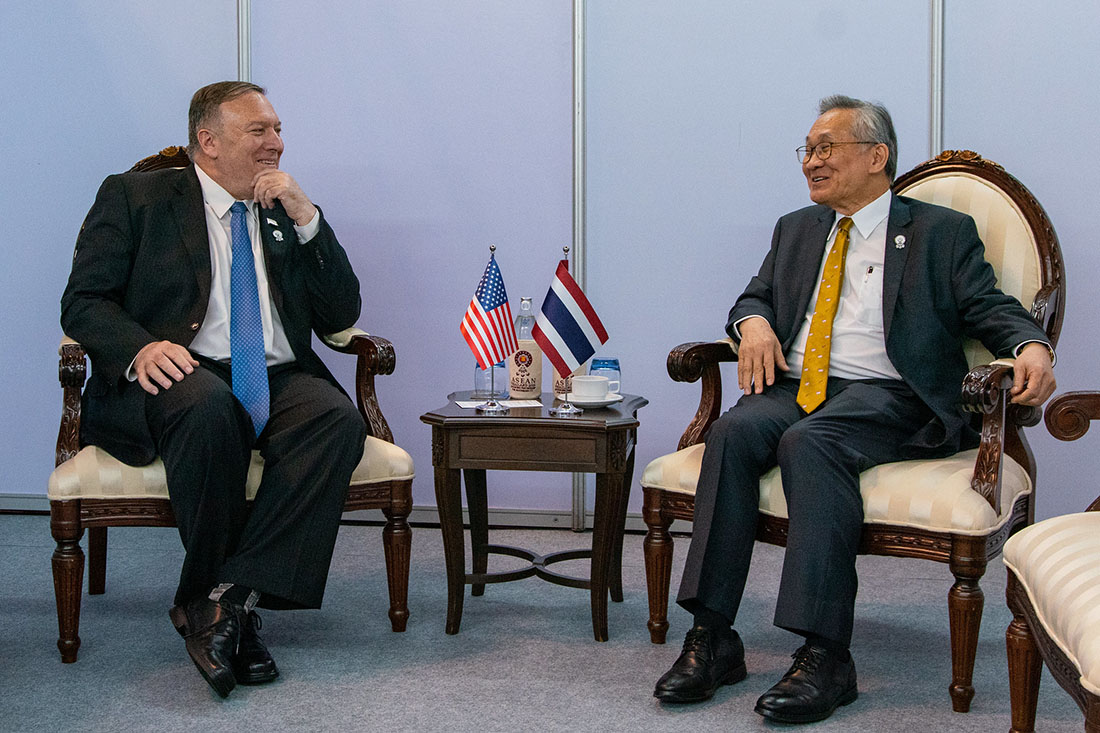InAsia
Insights and Analysis
Pompeo to ASEAN: The U.S. Is Committed
August 14, 2019
U.S. secretary of state Mike Pompeo came to the 52nd annual ASEAN Foreign Ministers’ Meeting in Bangkok with one message in mind: that America is committed to engagement with the region, and with Thailand, a treaty ally, in particular.
Speaking to a packed house at the Siam Society on August 1, in the heart of Bangkok, Pompeo said the United States cherishes its 200-year relationship with Thailand, although America has sometimes appeared to forget the importance of these bilateral ties, and others, “who don’t have our mutual best interests at heart,” have attempted to exploit the situation when the relationship seemed to cool.

U.S. secretary of state Michael R. Pompeo delivers a speech,”The U.S. in Asia: Economic Engagement for Good,” in Bangkok, Thailand, on August 2, 2019. Photo: Ron Przysucha / U.S. State Department.
Though Pompeo did not mention China by name, Beijing was on many people’s minds during the week-long meeting. In the last five years, under the military government of Prime Minister Prayut Chan-ocha, Thailand has turned to China for military hardware, including submarines and armored personnel carriers. But Kavi Chongkittavorn, a senior fellow at the Institute of Security and International Studies, a Thai think tank, says Thailand was merely looking after itself. “In reality, Thailand is for Thailand,” Kavi said.
Moreover, if the past five years saw a boost in Thai-Chinese defense ties, a retrenchment may be imminent. According to recent reports, the United States has just approved the sale of 60 Stryker armored personnel carriers to Thailand. Although this is just a fraction of what Thailand spent on Chinese military hardware, said Kavi, it makes Thailand the first non-U.S. user of the wheeled infantry vehicles.
While the United States condemned Thailand’s 2014 military coup and halted U.S. military aid to the Prayut government, Washington has been seeking warmer ties with Bangkok since as far back as February 2016, when President Barack Obama met Prayut on the side of an ASEAN summit in California. Prayut also visited President Donald Trump in the Oval Office in October 2017. General elections in March returned Prayut as the country’s prime minister, and in his speech Pompeo commended “our Thai friends for returning to the democratic fold.”
Pompeo held a brief side meeting with his Chinese counterpart, Foreign Minister Wang Yi. Both played down the rift between the two countries, with Wang describing the meeting as “deep communication” that “helped to increase our mutual understanding,” while Pompeo stated, “when it advances U.S. interests, we are ready to cooperate with China.”
Although Pompeo did not call on Thailand or other Southeast Asian nations to pick sides, insisting that U.S. engagement in the region is not a “zero-sum game,” he urged Australia, where he travelled from Bangkok, to stand up to what he considered to be China’s unfair trade practices and its militarization of the South China Sea.

Photo: Ron Przysucha / U.S. State Department.
Southeast Asia’s growing prosperity was not preordained, he said; it came about because of political freedom and free trade, and he reminded the audience that key shipping lanes in the Indo-Pacific region are protected by American sailors. “We want a free and open Indo-Pacific that’s marked by the core tenets of the rule of law, of openness, of transparency, of good governance, of respect for sovereignty of each and every nation, true partnerships,” Pompeo said.
Speaking at the Siam Society, Pompeo stressed the compatibility between American principles and Asian prosperity and pointed to the “solid partnership” with Thailand as a win-win proposition. He cited a working-class Thai couple who in 2006 transformed their small chicken farm into an enterprise that generates $78,000 monthly after they partnered with Cargill, an American company that has been in Thailand since 1968.
“[Cargill] worked with the family to improve productivity, to improve efficiency, to help them with management techniques. That partnership with America worked out pretty darn well,” Pompeo said. “And when they’re ready to grow further, they know they have a solid partner in that great American business.”
The formula is simple, said Pompeo: “property rights, the rule of law, lower taxes, an overall lighter touch from government regulation.” Governments in the region may have been instrumental in creating “national champion” companies, he argued, but state-led growth can only go so far, “because in the end, human flourishing only really blossoms when governments step back.”
That formula, said Pompeo, has created homegrown giants like Samsung, Honda, Taiwan Semiconductor, Mahindra & Mahindra, and many others. “And the United States was there. It was there with you all the way, and it will be, helping you grow and forging ever-closer ties. We built APEC, we built ASEAN and the Lower Mekong Initiative, and we did so with you, alongside of you,” Pompeo said.
“Importantly, too, we invested in your human capital. Our educational programs and universities have nurtured thousands of Asian leaders for decades, from local leaders to heads of state,” he added.
Pompeo said more than 4,200 American companies operate within ASEAN, investing over a trillion dollars in the region. “There is no other country anywhere that even comes close.”
But for former Thai ambassador Kobsak Chutikul, the specific details of U.S. investments in Thailand and the region did not bring greater clarity on America’s Indo-Pacific strategy. “Is it to be a new web of economic and trading arrangements, a defense-oriented alliance system, or a loose network of like-minded partners to counter the rise of China? And does the situation call for a Cold War clarity and new architecture?” Kobsak asked.
Kobsak said there was widespread uneasiness in the region, as reflected in the series of bilateral meetings on the sidelines in Bangkok between ministers who were trying to address new and ongoing bilateral disputes. “Deep down, people in the region quietly admire President Trump for standing up forcefully to China. But at the same time, they are not sure about the strength of American commitment to other countries that might choose to openly stand with the U.S.”
Pompeo’s visit to Bangkok came on the day that President Trump announced a new 10 percent tariff on an additional $300 billion worth of Chinese imports, adding to the existing 25 percent tariff on $250 billion of imports already in effect.

U.S. secretary of state Michael R. Pompeo meets with Thai foreign minister Don Pramudwinai at the Centara Grand in Bangkok, Thailand on August 1, 2019. Photo: Ron Przysucha / U.S. State Department.
During the question-and-answer session with Bloomberg’s Haslinda Amin, Pompeo urged China to return to an earlier agreement that he believes could provide the basis for a settlement between the two sides. “We want fairness, evenness, reciprocity. These are core concepts. They’re what I spoke about. And when that happens, Asia will thrive, Southeast Asia will thrive, the United States global trading system will thrive,” Pompeo said. “But it cannot be the case that a nation uses protectionism to protect its own goods and uses predatory tactics to deny others’ economies the chances to grow,” he added.
Pompeo praised China for its role in trying to convince North Korea to give up its nuclear weapons program and dismissed suggestions that Washington has not been tough enough on Pyongyang. He expressed “regret” that his North Korean counterpart did not attend the annual ASEAN meetings in Bangkok, but he said he was optimistic at the possibility of fresh discussions in the future.
Participants at the Siam Society event included members of the diplomatic community and business leaders. Most noticeable was a group of alumni from the Young Southeast Asian Leaders Initiative, a U.S.-funded project that promotes civic engagement and education for youth from the region.
Don Pathan is senior program officer for regional security cooperation for The Asia Foundation in Thailand. He can be reached at [email protected]. The views and opinions expressed here are those of the author, not those of The Asia Foundation.
About our blog, InAsia
InAsia is posted and distributed every other Wednesday evening, Pacific Time. If you have any questions, please send an email to [email protected].
Contact
For questions about InAsia, or for our cross-post and re-use policy, please send an email to [email protected].The Asia Foundation
465 California St., 9th Floor
San Francisco, CA 94104
The Latest Across Asia
Program Snapshot
April 18, 2024
News
April 17, 2024

2024 Lotus Leadership Awards
Thursday, April 25, 2024, New York City
The Lotus Leadership Awards recognize contributions towards gender equality in Asia and the Pacific







0 Comments